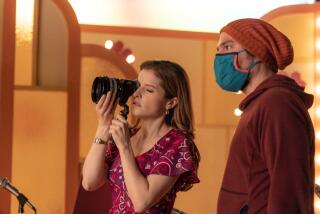MOVIE REVIEW : ’28 UP’: FOUR AGES OF MAN--AND WOMAN
- Share via
How did their lives turn out? From Dickens to Danielle Steele, we have avidly followed the twists and turns of fiction for the answer to just that question. In Michael Apted’s enthralling “28 Up,” we watch the real thing: the unfolding of the lives of 14 irrepressible young British schoolchildren, posh, poor and in between, from cities, suburbs and farms, caught at seven-year intervals from the ages of 7 to 28. Dickens would have adored it. (Winner of the equivalent British Academy Award, “28 Up” is at the Nuart through Wednesday.)
Besides its canny mix of personalities and Apted’s gifts as an interviewer--now empathic, now dangerously blunt--what makes “28 Up” so mesmerizing is its fluidity. We move back and forth seamlessly and with a certain wit in the lives of each child. Suzi, bored, rich, chain-smoking and brittle at 21, has no sooner announced that neither babies nor the country are for her than we cut to the yawning face of tiny Oliver, her younger son. At 28, she is virtually transformed by motherhood and a secure marriage into a warm young country matron, three-piece-suited husband and Prince Charles spaniel by her side.
Paul, an engaging, almost inarticulate 7-year-old, in a children’s home after his parents’ divorce, explains earnestly why he could never marry: A wife would make him eat his greens, you see, and he hates greens. We find him at 28, as a mustachioed Australian immigrant, almost blushing as his fine, sturdy wife puts her finger on his original appeal for her: “his helplessness.”
A Melbourne bricklayer now, with two sweet children, his own business and what seems to be a reasonable assessment of his strengths and weaknesses, Paul seems absolutely to have found himself. Then the film’s editing takes us back for one last echo from the little, lonely boy, again explaining why he could never marry. (Oral Norrie Ottie and Kim Horton are the editors; their work is marked by a lovely, almost intuitive sense of rightness and deep intelligence.)
As the film’s portraits continue, you realize that perhaps early emigration was another element in Paul’s success. The first interviews, then called “7 Up,” were done in 1963--the time of the Beatles, Mary Quant, swinging London and an optimistic sense that 800-year-old class barriers might be coming down for good.
Over at the leftish-oriented Granada Television, they weren’t so sure. So the original interviews, for which Apted was a researcher, were done, with their subjects’ wide cross section of backgrounds. Just how surely these kids’ feet were placed on their future paths became all too clear.
There were a few exceptions: Tony, the Cockney cabbie who began as a jockey and ended as a well-balanced husband and father, quite against Apted’s expectations, one suspects. But there is also the film’s most jaw-dropping trio, John, Andrew and Charles, to the manner insufferable born. At the age of 7, they can drawlingly tick off their paths from a “good” prep school through Oxford or Cambridge to the Bar. (Paul, asked the same question, says: “What’s a university?”) Apted asks the trio what newspapers they read: John regularly checks the Financial Times, “because I’ve got shares in it.” Another shudders at the idea of free schools, “because poor people would come rushing in.” You wish to shake not them but their implacable parents.
(Interestingly enough, it’s from this trio that the program’s only two dropouts have come. John, now indeed a barrister, opted out of the fourth interview, as did Charles, now a BBC documentarian--who is missed.)
Although the ‘60s optimism was unfounded, and Britain has clung to her rigid class structure and to a government that one subject, Peter, a Liverpool-born teacher, calls levelly “the most incompetent, uncaring bloody shower we’ve ever had,” there is an astonishingly cheerful air to most of these young people. There’s even one act of class rebellion.
Pink-cheeked, Oxford-educated Bruce (who looks like one of the multitudinous Kennedys), who at age 7 wants to be a missionary in Africa, now lives in a council flat in a poor section of London, cheerfully teaching mathematics to Bangladesh immigrant children. However, his equal in brilliance, Nick, who persevered in his study of physics at Oxford because he hoped his work in nuclear fusion “could be useful to people,” has left England for the University of Wisconsin. A sweet, solitary village boy, caught by the camera like a country Christopher Robin in Wellington boots, Nick could find no place for further research in the country that trained him.
Just as you think you’re on to the rhythm of the film, Apted (with his splendid cameraman, George Jesse Turner) pulls out his two last cards: Neil, the sunniest, most wildly imaginative of all the capering little boys, and the gravely beautiful Simon.
Amazingly enough, during this 21 years there have been no divorces, no deaths, no serious accidents among this little band. But there is Neil, bright and caring, who now lives as a vagabond, his hair looking rat-chewed, his body rocking as he speaks in articulate rushes to Apted. Damaged somewhere, somehow, between 14 and 21, Neil takes our hearts. Optimists in the audience will hold out for his recovery; realists may suspect that it is Neil himself who may block the way.
Then there’s Simon, proud father of five, who has given his children what he lacked, “a father,” but will not--or cannot--admit before the camera that his job at a refrigeration warehouse is a dead end; a consequence of his being a black man in London.
“Give me a child until he is 7,” the Jesuit saying goes, “and I will give you the man.” In the thoughtful, brilliant and undeniably melancholy view of Michael Apted and company, given the political climate of Britain over the last 21 years, the man, or woman, is only too indelibly stamped by the age of 7.
‘28 UP’
Distributed by First Run Features. A Granada Film and Television production. Executive producer Steve Morrison. Producer/director Michael Apted. Camera George Jesse Turner. Editors Oral Norrie Ottie, Kim Horton. Research Claire Lewis.
Running time: 2 hours, 13 minutes.
Times-rated: Mature.
More to Read
Only good movies
Get the Indie Focus newsletter, Mark Olsen's weekly guide to the world of cinema.
You may occasionally receive promotional content from the Los Angeles Times.










